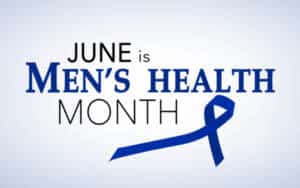5 Tips for Men’s Health Month
 By: Vikil Girdhar, MD – June is Men’s Health Month, a time to increase awareness of preventable health problems and encourage early detection and treatment of disease among men and boys. Research and studies continue to show a significant difference when it comes to the health of men compared to women. While these differences are often associated with certain behaviors, it also helps pinpoint major issues that need to be addressed.
By: Vikil Girdhar, MD – June is Men’s Health Month, a time to increase awareness of preventable health problems and encourage early detection and treatment of disease among men and boys. Research and studies continue to show a significant difference when it comes to the health of men compared to women. While these differences are often associated with certain behaviors, it also helps pinpoint major issues that need to be addressed.
Let’s take a minute to look at some facts:
- According to the CDC, the average lifespan for men is about five years less than women, and over the years there has been a gradual increase in this gap.[1]
- The top three causes of death for men include heart disease, cancer, and unintentional injuries.[2]
- Men are almost twice as likely as women to die of a heart attack [3] and significantly more likely to die of cancers as compared to women.[4]
- Men are also less likely to undergo treatment for mental health conditions such as depression, resulting in nearly a 4x increased likelihood of committing suicide.[5]

There isn’t one particular reason for this lifespan and health disparity, but there is a group of factors that contribute to the cause. A higher percentage of men do not have healthcare coverage – this, in turn, leads to a lower use of healthcare resources, as men are less likely to schedule routine doctor’s appointments. When compared to women, men make about half as many doctor visits for preventive care. They also tend to be involved and employed in more dangerous occupations such as mining, firefighting, and construction.
One of the most problematic behaviors contributing to this lifespan disparity is the non-help-seeking nature amongst men. Statistics show that women are 33% more likely to visit their doctor and 100% better at maintaining screening and preventive services than men.[6] Preventive visits are essential to improving everyone’s health, regardless of their age or gender.
Here are five recommendations for men to help them stay on top of their game.
1. Stay updated on your vaccinations! Now that we are recovering from the COVID-19 pandemic, it is crucial to be up to date on vaccinations. Your primary care provider (PCP) will help keep you on track as there are many that are recommended based on age. Not only do immunizations help you stay healthy, but they keep your body’s immune system functioning to its highest level. Vaccines are usually recommended at the time of your annual visit with your PCP.
2. Do your screenings! Your PCP will do screening labs if you have certain risk factors, such as family history or weight changes. Screenings for diabetes, thyroid disease, liver issues, anemia, and cholesterol are part of the routine bloodwork often done at the doctor’s office. Men are typically given prostate exams at the age of 40, which is done annually to make sure no enlargement or masses are present which may cause complications down the line. A colonoscopy is another recommendation to assess the risk for colon cancer by age 50 (or sooner if there is family history). A lung CT scan is another common practice for those ages 50 or over who currently smoke or have smoked in the past to check for lung cancer. Also, during your visits with your PCP, depression screenings are done to make sure that you are not at a higher risk of developing major depression. They will also make sure that routine blood pressure and weight/height checks are done and are in the normal range.
3. Lower your stress! Statistics show that men have more difficulty handling stress compared to women.[7] This may be because women typically have better social networks, or a circle of friends and they are able to confide in them. The male mentality often tends to avoid discussing their feelings and as a result, are less likely to disclose such issues with their PCP, resulting in many cases of major depression/anxiety being undiagnosed. Stress itself is linked to higher blood pressure and body weight, so it’s important to take time to focus on activities that will help relieve stress.
4. Watch your risky behaviors! Limiting alcohol consumption and not smoking are almost routinely advised by your PCP, as they can result in liver disease, cirrhosis, and alcohol dependence. Smoking contributes to a wide variety of cancers and is one factor that is the most changeable. Nicotine replacement therapy options can help you quit smoking; some examples include Chantix, nicotine patches, and nicotine gum. There are many resources and programs that can help you reduce your alcohol intake, such as counseling or Alcoholics Anonymous, which your PCP can refer you for. If you’re sexually active, it’s important to routinely be tested for sexually transmitted diseases and practice safe sex. It’s also important to avoid illicit drug or non-prescription medication use. Lastly men, please use your seatbelts and wear helmets if you are riding a motorcycle!
 5. Watch what you eat! As the saying goes, you are what you eat. Eating large amounts of processed foods or foods with a high amount of sodium (salt) are main causes for obesity. Obesity is linked to increased occurrences of heart disease, Type 2 diabetes, and breathing issues. Focus on lean proteins and foods that provide good nutrition and a large number of vitamins. Some examples include chicken, turkey, fish, Greek yogurt, beans, and lentils. Foods with high fat and/or carbohydrate content should only be eaten in moderation; examples include white bread, pasta, pizza, fried foods, pastries or cookies, processed meats and cheeses, and most fast-food meals. Exercise goes a long way, so working out three to four times a week for about 30 minutes will help your body and your mind.
5. Watch what you eat! As the saying goes, you are what you eat. Eating large amounts of processed foods or foods with a high amount of sodium (salt) are main causes for obesity. Obesity is linked to increased occurrences of heart disease, Type 2 diabetes, and breathing issues. Focus on lean proteins and foods that provide good nutrition and a large number of vitamins. Some examples include chicken, turkey, fish, Greek yogurt, beans, and lentils. Foods with high fat and/or carbohydrate content should only be eaten in moderation; examples include white bread, pasta, pizza, fried foods, pastries or cookies, processed meats and cheeses, and most fast-food meals. Exercise goes a long way, so working out three to four times a week for about 30 minutes will help your body and your mind.
The men in our lives are important! This Men’s Health Month let’s focus on helping them optimize their health. There are several factors that need to be taken into consideration, but these five tips are a great place to start. Routine doctor’s appointments and going for preventive well-visits are another simple step men can take to feel better and to help reduce the health disparity between men and women. Please call AxessPointe Community Health Centers to schedule a wellness visit with any of our primary care providers at 888-975-9188. To learn more about AxessPointe, visit axesspointe.org.
References
- https://www.cdc.gov/nchs/data/factsheets/factsheet_NVSS.pdf
- https://www.cdc.gov/healthequity/lcod/men/2017/all-races-origins/index.htm
- https://www.health.harvard.edu/heart-health/throughout-life-heart-attacks-are-twice-as-common-in-men-than-women
- https://www.cdc.gov/cancer/dcpc/resources/features/cancerandmen/index.htm
- https://afsp.org/suicide-statistics/
- https://integrisok.com/resources/on-your-health/2019/june/why-dont-men-see-doctors#:~:text=The%20CDC%20reports%20that%20women,maintaining%20screening%20and%20preventive%20care.
- https://www.apa.org/news/press/releases/stress/2010/gender-stress


